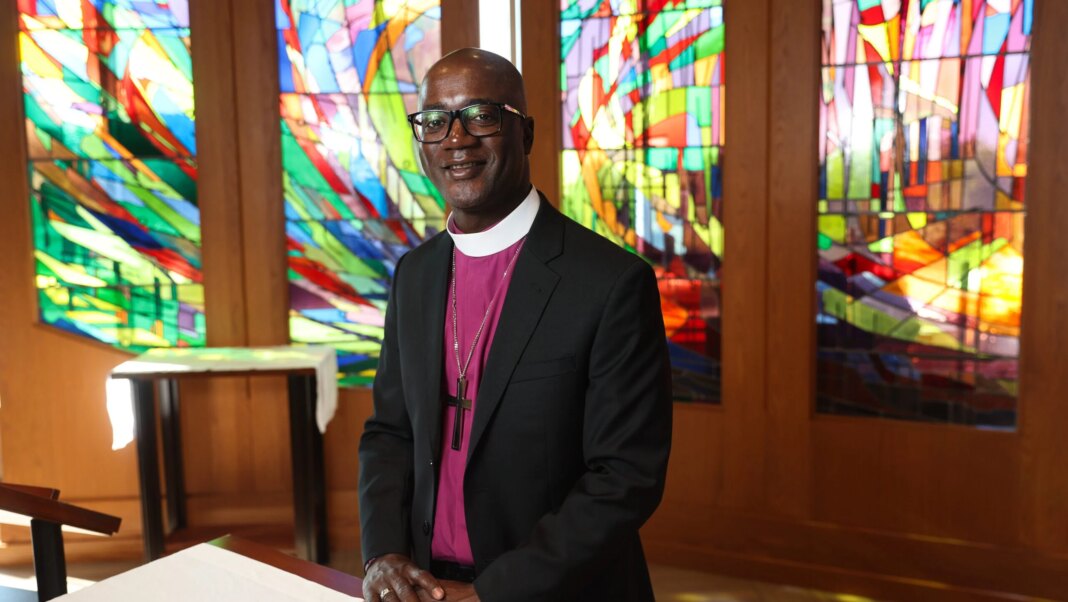A Historic Moment for the Evangelical Lutheran Church in America
The Evangelical Lutheran Church in America (ELCA) recently marked a significant milestone by installing the Rev. Yehiel Curry as its first Black presiding bishop. This landmark event carries profound implications for the predominantly white denomination, which has been navigating its identity amidst changing social landscapes.
The Weight of the Moment
“It’s a historical moment that hasn’t fully resonated with me yet,” Curry remarked in an interview prior to his installation. His appointment symbolizes not only personal achievement but also the gradual, yet pivotal, shift in the church’s leadership dynamics. Curry succeeded the Rev. Elizabeth Eaton, who herself broke barriers as the first woman to lead the ELCA. During her 12-year tenure, Curry witnessed a notable transformation within the conference of bishops, where representation shifted from a majority male to a majority female presence.
Vision for Diversity
Curry emphasized the importance of representation, expressing hope that this shift may inspire more leaders of color within the church. “Her presence mattered,” he reflected on Eaton’s influence, illustrating that diversity is essential for church growth and relevance. Curry’s installation took place in a formal ceremony at Central Lutheran Church in Minneapolis, as his six-year term officially commenced on October 1, following his election at the ELCA Churchwide Assembly in July.
Cultural Context
American Lutheranism is often characterized by its roots in Scandinavian and German heritage, predominantly concentrated in the upper Midwest. Statistically, the ELCA is over 95% white. However, the church is actively investing in multicultural ministries and fostering local congregations of color. This progressive approach aims to counter stereotypes and embrace a more inclusive future.
The Rev. Leila Ortiz, a friend and former bishop, remarked on the challenges yet to be faced by Curry. “He is representing a very white denomination as a Black man from the United States. I trust him, and I trust God,” she said, underscoring the faith the community has in Curry’s leadership.
Challenges Ahead
As the leader of the largest American Lutheran body, Curry steps into a role beset with challenges common to many mainline Protestant denominations. The ELCA has experienced significant shifts, including theological debates over LGBTQ+ inclusion and a notable decline in membership, from 5.3 million in 1988 to 2.7 million currently. The church made headlines for its progressive stances, including the blessing of same-sex marriages since 2009 and the elevation of the first openly gay and transgender regional bishops in subsequent years.
A Unique Path to Leadership
Curry’s journey to becoming presiding bishop is both unique and inspiring. Growing up as the seventh of 11 children on the South Side of Chicago, he was raised Catholic and later transitioned into the world of social work and education. His path to the ELCA began when he discovered Shekinah Chapel, a burgeoning congregation with a strong mentorship program. “It was the traditional Black worship experience but a bit more contemporary,” Curry shared, noting the blend of cultural elements that resonated with him.
His rise within the church began as a lay leader before he eventually entered seminary. He was ordained in 2009, a moment that he describes as “uncommon,” highlighting his fortunate position of leading within a community that shaped him.
The Diversity Within Lutheranism
Curry’s elevation is also a reminder of the rich history of African American contributions to Lutheranism. From the Rev. Nelson Wesley Trout, the first Black ELCA synod bishop, to earlier figures like Rev. Will Herzfeld, Black leaders have long been part of the Lutheran narrative. Historian Rev. James Thomas pointed out that African Americans have been present in Lutheran churches since the 1600s.
Globally, the landscape of Lutheranism is vibrant, with some of the fastest-growing congregations located in Africa. Curry’s leadership could help highlight this importance, showcasing the longstanding contributions of African Americans to a faith tradition often perceived as homogeneous.
Beyond Tokenism: A Dual Call to the ELCA
Bishop Regina Hassanally underscored that Curry’s appointment creates a dual call—for him personally and for the church as a whole. She cautioned against the temptation to view the calling of a leader of color as sufficient. Instead, it’s an opportunity to enhance supports and infrastructure that will allow for authentic leadership embracing a multifaceted identity.
Curry has articulated his vision, focusing on creating a more connected church, emphasizing the importance of building relationships from local congregations up through the hierarchy. “I want to dig deeper into what we’ve affirmed already as a denomination,” he noted, reflecting a commitment to meaningful change rather than superficial strategies.
In this evolving landscape, Curry’s appointment is both a historic achievement and a critical juncture for the ELCA, challenging the church to broaden its perspective and embrace a future filled with diverse voices and experiences.



